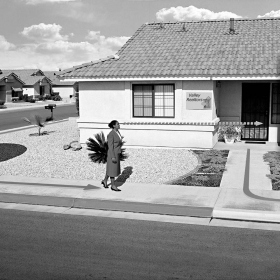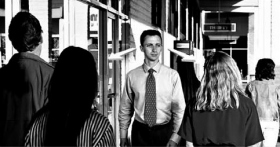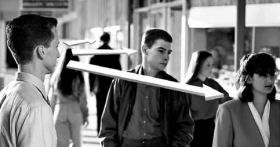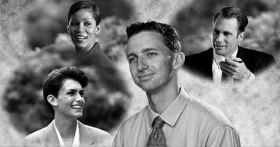To work or not to work? That is the question. The answer to that question in most men’s minds is EXHAUSTION.
One begins to feel after he has been long on a job, has been considerably abused on that job, that to work any more would be quite beyond his endurance. He is tired. The thought of doing certain things makes him tired. He thinks of raising his energy or of being able to force his way along just a little bit further. And if he does so, he is thinking in the wrong channels, since the answer to exhaustion has little, if anything, to do with energy.
Exhaustion is a very important subject not only to an individual involved in earning his own living, but to the state as well.
Scientology has rather completely established the fact that the downfall of the individual begins when he is no longer able to work. All it is necessary to do to degrade or upset an individual is to prevent him from working. Even the police have now come to recognize the basic Scientology principle that the primary thing wrong with a criminal is that he cannot work. And police have begun to look for this factor in an individual in establishing his criminality.
The subject of exhaustion is also the subject of “prevented work.” In the case of soldiers and sailors hospitalized during war, it is found that a few months in the hospital tends to break the morale of the soldier or sailor to such a point that he may become a questionable asset when returned to his service. This is not necessarily the result of his lowered abilities. It is the result of injury
Without actually adding up these principles, the word “exhaustion” began a general use coupled with “neurosis.” Now, this was based on the fact that people with a neurosis simply looked exhausted. There was no more coordination to it than that. Actually, a person who has been denied the right to work, particularly one who has been injured and then denied the right to work, will eventually encounter exhaustion.
Technically, in Scientology, it is discovered that there is no such thing as a “
Exhaustion can, then, be trained into a person by refusing to allow him as a child to have any part of the society. Or it can be beaten into a person by the various injuries or shocks he may receive incident to his particular activity. Clear up either of these two points and you have cleared up exhaustion. Exhaustion, then, is actually the subject of a Scientology practitioner—since only a Scientologist can adequately handle it.
There is a point, however, which is below exhaustion. This is the point of not knowing when one is tired. An individual can become a sort of hectic puppet that goes on working and working and working, without even realizing that he is working at all, and suddenly collapsing from a tiredness he was not experiencing.
Here, the individual has failed to control things. Eventually, he is incapable of handling anything even resembling tools of the trade or an environment of work and so is unable to inhabit such an environment or handle such tools. The individual can then have many
There are some means of recovering one’s energy and enthusiasm for work, short of close work with a Scientology practitioner. These are relatively simple and very easy to understand.
Extroversion and Introversion
We have, in Scientology, something we call INTROVERSION.
And, something else we call EXTROVERSION.
Introversion is a simple thing. It means “looking in too closely.”
And extroversion is also a simple thing. It means nothing more than “being able to look outward.”
It could be said that there are “introverted personalities” and “extroverted personalities.” An extroverted personality is one who is capable of looking around the environment. An introverted personality is only capable of looking inward at himself.
A person who is capable of looking at the world around him and seeing it quite real and quite bright is, of course, in a state of extroversion. In other words, he can “look out.” He can also work. He can also see situations and handle and control those things which he has to handle and control and can stand by and watch those things which he does not have to control and be interested in them, therefore.
The person who is introverted is a person who has probably passed exhaustion some way back. He has had his attention focused closer and closer to him (basically, by old injuries which are still capable of exerting their influence upon him) until he is actually looking inward and not outward. He is
Now let us take the actual subject of work.
Work is “the application of attention and action to people or objects located in space.”
When one is no longer able to
In work, his attention is
Let us take an accountant. An accountant’s eyes are on books at fixed distances from his eyes. At length, he becomes “
A person who has a machine or books or objects continually at a fixed distance from him, leaves his work and tends to keep his attention fixed exactly where his work was. In other words, his attention never really leaves his work at all. Although he goes home, he is still really “sitting in the office.” His attention is still fixed on the environment of his work. If this environment is coincident with some injury or accident (and who does not have one of these, at least?) he begins to feel weariness or tiredness.
Is there a cure for this? Of course, only a Scientology practitioner could clear up this difficulty entirely. But the worker does have something which he can do.
Now, here is the wrong thing to do, regardless of whether one is a bookkeeper, an accountant, a clerk, an executive or a machinist. The wrong thing to do is to leave work, go home, sit down and fix attention on an object more or less at the same distance from one as one confronts continually at work.
In the case of a foreman, for instance, who is continually talking to men at a certain distance away from him, the wrong thing for him to do is to go home and talk to his wife at the same distance. The next thing she knows, she will be getting orders just as though she were a member of the shop!
Definitely the wrong thing to do is to go home and sit down and read a paper, eat some dinner and go to bed. If a man practiced the routine of working all day and then sitting down “to rest” with a book or a newspaper in the evening, it is certain that, sooner or later, he would start to feel quite exhausted. And then, after a while, would fall even below that and would not even wonder at his unwillingness to perform tasks which were once very easy to him.
Is there a right thing to do? Yes, there is. An individual who is continually fixed upon some object of work should fix his attention otherwise after working hours.
Take a Walk
There is a Scientology procedure known as:
TAKE A WALK.
This procedure is very easy to perform.
When one feels tired on finishing his work—no matter if the thought of doing so is almost all that he can tolerate without
In doing this, it will be found that one will become a little brighter at first and then will become very much more tired. He will become sufficiently tired that he “knows” now that he should go to bed and have a good night’s sleep. This is not the time to stop walking, since he is walking through exhaustion. He is “walking out” his exhaustion. He is not handling the exhaustion by physical exercise. The physical exercise has always appeared to be the more important factor to people, but the exercise is relatively unimportant. The factor that is important is the unfixing of his attention from his work to the material world in which he is living.
Take a Walk is, within reason, a near cure-all.
If one feels antagonistic towards one’s wife, the wrong thing to do is to “beat her”! The right thing to do is to go out and take a walk around the block until one feels better and make her walk around the block in the opposite direction until an extroversion from the situation is achieved—since it will be discovered that all domestic quarrels, particularly amongst working people, stem from the fact of having been overfixed (rather than overstrained) on their work and the situations connected with it. One has failed to control certain things in his working environment. He then comes home and seeks to find something he can control. This is usually the marital partner or the children. And when one fails even there, he is apt to drop downscale
The extroversion of attention is as necessary as the work itself. There is nothing really wrong with introverting attention or with work. If one didn’t have something to be interested in, he would go to pieces entirely. But if one works, it will be found that an unnatural tiredness is apt to set in. When this is found to be the case, then the answer is not a “drop into unconsciousness” for a few hours—as in sleep—but in actually extroverting the attention and then getting a really relaxing sleep.
These principles of introversion and extroversion have many
Remember that, when doing it, one will get more tired at first and will then get fresher. This phenomenon has been noted by athletes. It is called the “second wind.” The second wind is really getting enough environment and enough mass in order to “
Look Them Over
Similar to Take a Walk is another procedure known as:
LOOK THEM OVER.
If one has been talking to people all day, has been selling people all day or has been handling people who are difficult to handle all day, the wrong thing to do is to run away from all the people there are in the world.
You see, the person who gets overstrained when handling people has had large difficulties with people. He has perhaps been operated upon by doctors and the half-seen vision of them standing around the operating table identifies “all people” with “doctors” (that is to say, all people who stand still). This, by the way, is one of the reasons why doctors become so thoroughly hated in a society—since they do insist on practices known as surgery and anesthesia and such incidents become interlocked with everyday incidents.
Exhaustion because of contact with people is due to one’s attention having been fixated upon certain people while his attention, he felt, ought to be on other people. And this straining of attention has actually cut down the number of people that he was observing.
The cure for this is a very simple one. One should go to a place that is very well populated—such as a railroad station or a main street—and should simply walk along the street noting people. Simply look at people, that is all. It will be found, after a while, that one feels people “aren’t so bad” and one has a much kinder attitude toward them. But, more importantly, the job condition of becoming overstrained with people tends to go away if one makes a practice of doing this every late afternoon for a few weeks.
This is one of the smartest things that a salesman can do, since a salesman, above and beyond others, has a
One of the things that happens to people high in government is that they are being continually “protected from” the people. And they, at length, become quite disgusted with the whole subject and are apt to do all manner of strange things. (See the lives of
Broad Application
This principle of introversion and extroversion could go much further in a society than it does. There is something that could be done—by the government and by businesses in general—which would probably eradicate the idea of strikes and would increase production quite markedly. Workers who strike are usually discontented not so much with the “conditions of work,” but with work itself. They feel they are being victimized. They are being pressed into working at times when they do not want to work. And a strike comes as an actual relief. They can fight something. They can do something else than stand there and fiddle with a piece of machinery or account books. Dissatisfied workers are striking workers. If people become exhausted at work, if people are not content with work, if people are upset with work, they can be counted upon to find a sufficient number of
Any management given sufficient income to do so, if that management is not terribly irrational, will pay a decent working wage. And any workman given a half-chance will perform their duties cheerfully. But once the environment itself becomes overstrained, once the company itself has become introverted by “overt acts” on the part of the government, once the workers have been shown that they have no control over management—there can be, after that, labor disputes. Underlying all these obvious principles, however, are the principles of introversion and extroversion. Workers become so introverted at their task that they no longer are capable of affinity for their leaders and are no longer capable, actually, of viewing the environment in which they work. Therefore, someone can come along and tell them that “all the executives are
In the absence of broad treatment on individuals, which is a
The cure would be to extrovert workers on a very broad scale. This could be done, as one solution, by making it possible for all workers to have two jobs. It would be necessary for the company or related interests—such as the government—to actually make available a sufficient number of “public works projects” to provide work for workers outside the sphere of exact application. In other words, a man who is made to work continually inside and at a very fixed task, would find a considerable relief at being able to go outside and work—particularly at some disrelated task.
As an example, it would be a considerable relief to an accountant to be able to dig ditches for a while. A machinist, running a stationary machine, would actually find it a very joyful experience to push around a bulldozer.
Such a plan, then, would actually take introversion and extroversion
In short, there are many things that could be done with the basic principle of introversion–extroversion.
The principle is very simple. When an individual is made too introverted, things become less real in his surroundings, and he has less affinity for them and cannot communicate with them well. In such a condition, he becomes tired easily. Introversion results in weariness, exhaustion and then an inability to work. The remedy for it is extroversion—a good look at and communication with the wider environment. And unless this is practiced, then in view of the fact that any worker is subject to injuries or illnesses of one kind or another, a
increased, added to or intensified.
the part of a military force farthest from the fighting front.
a reference to energy being gradually lessened, as when a battery is in contact with an electrical device and is drained by continual use.
accompanying something or occurring as a result of it.
(of speech) that which is rude and offensive or criticizes rudely (and unfairly).
literally, to throw something (especially something light in weight). Hence, turn or direct toward someone or something.
drawing back or avoiding.
to face without flinching or avoiding. The ability to confront is actually the ability to be there comfortably and perceive.
fixed or held firmly.
not able to see far.
falling down in a state of exhaustion, as if with so much impact one drops down through the floor.
the actual physical objects, the things of life.
love, liking or any other emotional attitude; the degree of liking. The basic definition of affinity is the consideration of distance, whether good or bad.
to an extreme degree; in an intense manner.
results or consequences of something.
occurring along with something, or resulting or following from it.
to get rid of or exhaust the negative influence of something.
special interest in something for particular personal reasons.
Adolf Hitler (1889–1945), German political leader of the twentieth century who dreamed of creating a master race that would rule for a thousand years as the third German Empire. Taking over rule of Germany by force in 1933 as a dictator, he began World War II (1939–1945), subjecting much of Europe to his domination and murdering millions of Jews and others considered “inferior.” He committed suicide in 1945 when Germany’s defeat was imminent.
Napoleon Bonaparte (1769–1821), French military leader. He rose to power in France by military force, declared himself emperor and conducted campaigns of conquest across Europe until his final defeat by armies allied against him in 1815. Half a million men died in the Napoleonic Wars (1799–1815).
actual or supposed circumstances regarded as just cause for protest.
persons who seem fierce and cruel. The word comes from a fairy tale where a giant monster (ogre) eats humans.
of tremendous size or volume. From a story by French writer François Rabelais about Gargantua, a giant noted for his size and huge appetite.
from the phrase helping hand which means to give aid or assistance to someone. Hence, with a large hand is assistance of great quantity affecting many.
the worse an individual or situation gets, the more capacity he or it has to get worse. Spiral here refers to a progressive downward movement, marking a relentlessly deteriorating state of affairs, and considered to take the form of a spiral. The term comes from aviation where it is used to describe the phenomenon of a plane descending and spiraling in smaller and smaller circles, as in an accident or feat of expert flying, which if not handled can result in loss of control and a crash.
acceptable or agreeable to the mind or feelings.









